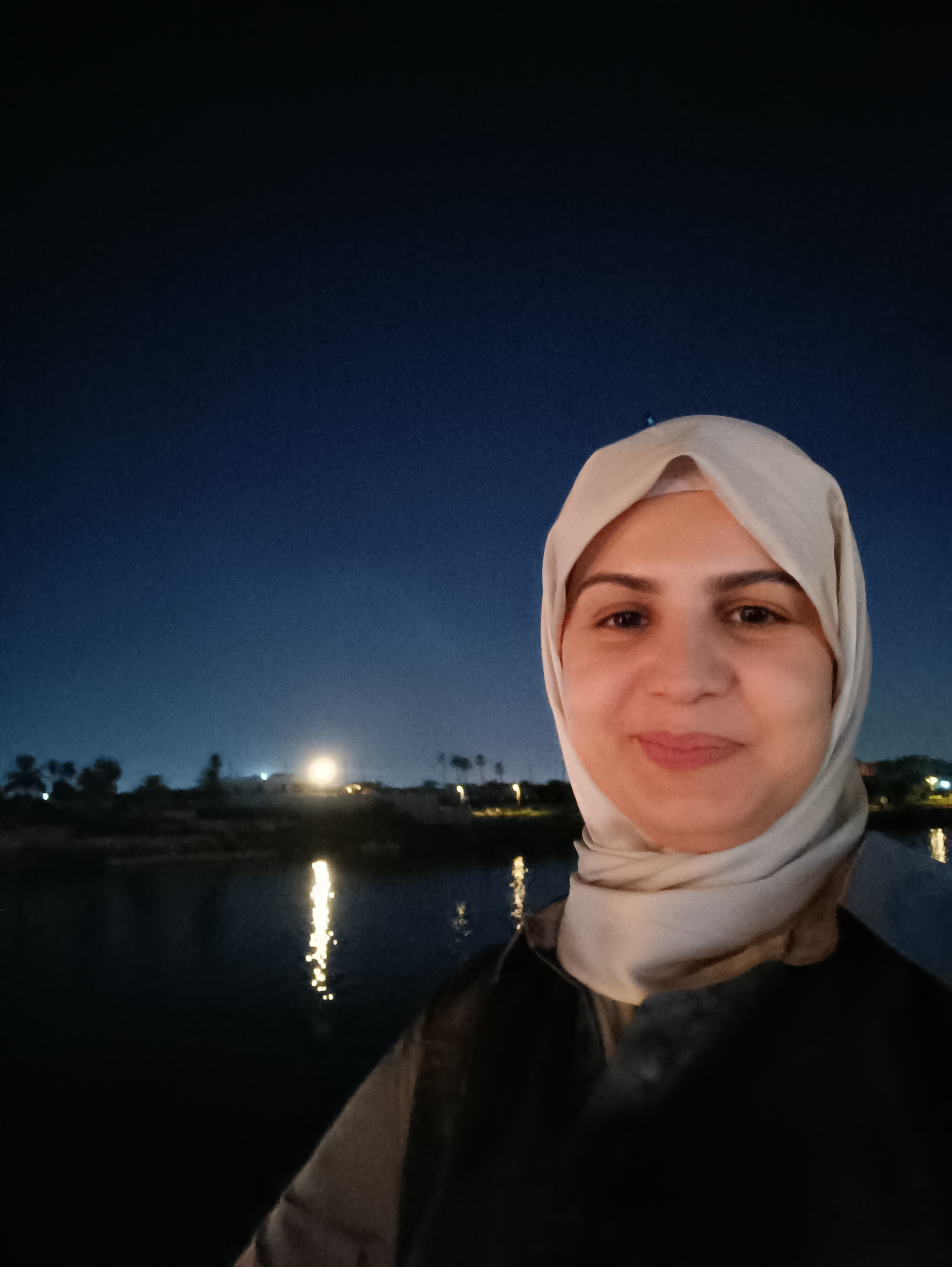
Sarah Rashid Ghayyib
Research InterestsAdsorption and activated carbon materials
Environmental sustainability and clean energy
Water Treatment
Simulation
Biodiesel
Petroleum Desulfurization
| Gender | FEMALE |
|---|---|
| Place of Work | Technical Engineering College/ Kirkuk |
| Position | Lecturer |
| Qualification | Ph.d |
| Speciality | Chemical Engineering |
| sarah.rashid23@ntu.edu.iq | |
| Phone | 07706218596 |
| Address | Iraq, Iraq, Kirkuk, Iraq |
Dr. Sarah Rashid Ghayyib Al-Karkhi is an academic lecturer specializing in Chemical Engineering. She is currently a lecturer in the Environment and Pollution Engineering Department at the Technical Engineering College of Kirkuk, Northern Technical University – Kirkuk (2024–present).
Previously, she served as a lecturer in the Technological Engineering for Chemical and Oil Industries Department at the Technical Engineering College in Mosul (2023–2024). She also worked at Knowledge University in Erbil (2021–2022) as a Quality Assurance officer and an academic lecturer in the Petroleum Department, where she taught courses such as Natural Gas and Fundamentals of Petroleum Engineering.
From 2018 to 2020, Dr. Al-Karkhi was a visiting lecturer at Koya University in the Chemical Engineering Department, delivering courses on Corrosion Engineering and Process Engineering Design. Simultaneously, she worked at Noble Institute in Erbil, teaching various subjects in the Refining Department, including Mass Transfer, Gas Technology, Fluid Mechanics, and Petroleum Technology.
Dr. Al-Karkhi began her career as a Chemical Engineer at a pharmaceutical company in Baghdad in 2012. She holds a Ph.D. in Chemical Engineering from the University of Baghdad (2017), a Master's degree from Al-Nahrain University (2012), and a Bachelor's degree from the same institution (2009).
Her research interests include petroleum technology, process simulation, and renewable energy. She has published five research papers and participated in one conference.
Languages
English (70%)
Skills
Teaching (80%)
Matlab (70%)
Aspen Hysys (70%)
Office (70%)
Supervision
Baban Omar Muhialdeen,, Sidra Abdulraqeeb Mahmood,Walaa Bahzad Saleh, Silav Salah Othman1,Osama Hasan Hussein, and Aya Nazeer Muhsin
Year: 2023Academic Degree: Bachelor
Supervisor Type: Supervisor
Supervisor State: Ungraduated
Oxidation Desulfurization of Petroleum Fraction
Academic Qualification
BSc. Chemical Engineering
Sep 1, 2005 - Jul 1, 2009BSc. Chemical Engineering. I was in second rank out of 18 graduates with an average of the four academic years of 70 out of 100. My project was “Nitrobenzene Production
Ph.D. in Chemical Engineering
Sep 1, 2013 - Jan 5, 2017Ph.D. in Chemical Engineering, with an average of 78 out of 100. The title of the thesis was “Desulfurization Of Kerosene By Activated Carbon Supported With Metal Oxides In The Presence Of Oxygen Gas.”
MSc. Chemical Engineering
Sep 1, 2009 - Apr 12, 2012MSc. Chemical Engineering, with an average of 78 out of 100. The title of the thesis was “Simulation And Experiment Investigation For Producing Biodiesel Using Batch Reactive Distillation.”
Working Experience
Lecturer [Visiting Lecturer]
Oct 1, 2018 - Oct 1, 2020Lecture
Publications
Synthesis and Characterization of Tri-Composite Activated Carbon
Sep 30, 2017Journal Iraqi Journal of Chemical and Petroleum Engineering
publisher Baghdad University
DOI https://doi.org/10.31699/IJCPE.2017.3.4
Issue 3
Volume 18
Activated carbon loading with metals oxides is new adsorbents and catalyst, which seem very promising for desulfurization process. The present study deals with the preparation of three metals oxides loaded on activated carbon (AC). The tri composite of ZnO/NiO/CoO/AC was characterized by X-Ray Diffraction (XRD), X-Ray florescence (XRF), N2 adsorption for BET surface area, pore volume and Atomic Force Microscopy (AFM). The effect of calcination temperature is investigated. The best calcination temperature is 250 o C based on the presence of phase, low weight loss and keep at high surface area. The surface area and pore volume of prepared tri composite are 932.97 m 2/g and 0.6031 cm 3/g respectively. The average particle size of tri-composite is 104.72 nm. Results confirmed a successful route for preparing the composite with promising characteristics.







